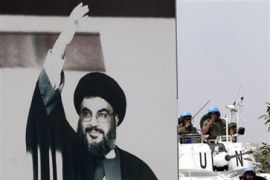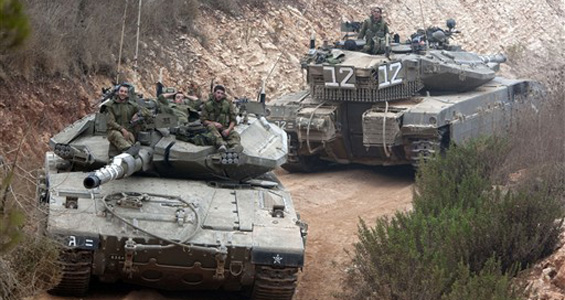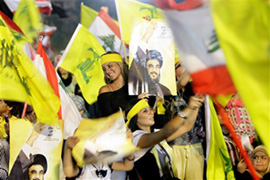Border skirmish a ‘fire douser’
Lamis Andoni says tensions along border with Israel may cool Lebanon’s internal problems.

 |
| Skirmishes along the border left two Lebanese soldiers and one Israeli soldier dead [AFP] |
Four years after Israel’s war in Lebanon ended, Hezbollah has announced that it is prepared to put its forces at the service of the Lebanese army should there be an Israeli attack or act of provocation.
The announcement by Hassan Nasrallah followed an exchange of fire between Israeli and Lebanese soldiers in which one Israeli soldier and two Lebanese soldiers and a journalist were killed.
The border skirmish marked a turning point for the Lebanese army, which was not involved in the 2006 war between Israel and Hezbollah. But the Lebanese army’s response to what it considered Israeli provocation, reasserted its role, which had been marginalised by the status accorded to Hezbollah as Lebanon’s main defender.
Internal tensions
| IN depth | |||||||||||||||||||||||||
|
While the skirmish may have heated things up along the Israeli-Lebanese border, it could in fact prove to be a fire douser for the escalating internal Lebanese tensions surrounding the alleged role of Hezbollah in the 2005 assassination of Rafiq al-Hariri, the late prime minister.
Leaked information suggested that the UN-backed Special Tribunal for Lebanon (STL) was set to declare that “unrestrained elements” within Hezbollah were involved in the assassination. Considering this leaked preliminary indictment to be a direct accusation against the Hezbollah leadership and movement, Nasrallah reacted strongly.
The movement’s leader has given at least two speeches warning that Hezbollah will react if any such declaration is made and accepted by the Lebanese government and accusing the STL of being part of “an Israeli project” to eliminate the Lebanese resistance.
Nasrallah, who is known for his shrewdness in adapting to developing crises, used Tuesday’s scheduled speech, which was originally intended to celebrate the group’s “victory” over Israel in the 2006 war, to undermine his opponents’ argument that Hezbollah makes decisions regarding war and peace in lieu of the Lebanese government.
“We contacted the president and the army command and told them that the party is at their service,” he said.
His announcement not only helps to restore some respect to the Lebanese army, which has been widely seen as impotent while Hezbollah has emerged as the sole power capable of confronting Israel in Lebanon, but may also help to defuse tensions over the expected STL announcement.
The expected announcement, which has not yet been confirmed by STL officials, has placed the country close to the edge, with Nasrallah saying he would resist any attempt to arrest even “half a member” of his party.
Nasrallah’s warnings have been taken seriously by those who recall the group’s armed takeover of some Beirut neighbourhoods when the government attempted to crack down on its communication network.
Then it was the Lebanese army that helped to prevent a confrontation that could have led to civil war when it announced that it would not take part in a “clamp down against the resistance”.
Arab mediation
It now seems that the army – this time by standing up to Israel – will help to ensure the success of top level Arab mediations to preempt an internal explosion in Lebanon.
For while Friday’s tripartite summit between Saudi Arabia, Syria and Lebanon injected some calm into an otherwise explosive situation, it did not offer a way out of the crisis.
Hezbollah and its supporters have cried foul over the alleged funding of the STL, but the country’s March 14 coalition has defended the tribunal.
The internal investigation into the assassination, followed by the establishment of the STL, was controversial from the outset. Relying on the testimonies of “eyewitnesses” whose credibility was later questioned, the international investigation initially pointed the finger at Syria.
But as Barack Obama assumed power and adopted a policy of engagement with Syria, needing its cooperation to ensure the safety of US troops during their scheduled withdrawal from Iraq, the STL also shifted direction, with all accusations against the country seeming to mysteriously disappear.
The STL’s new direction became clear when the German magazine Der Spiegel published leaked reports suggesting that the tribunal’s initial findings pointed towards Hezbollah – an accusation absent from original investigations.
Saad al-Hariri, the Lebanese prime minister and son of Rafiq, has reportedly discussed the expected findings with Nasrallah, prompting the latter to declare that he would reject them and expected the government not to attempt to arrest any members of his group.
Compromise
 |
| Nasrallah used a scheduled speech to offer the services of his movement to the army [AFP] |
This has placed Hariri in a difficult position, particularly as it was the Lebanese government that requested the formation of the STL. But in a speech, Hariri vowed “not to allow my father’s blood to stir disunity in Lebanon”, explaining that he would do everything in his power to ensure his father’s legacy as a unifier of the Lebanese.
His statements have led some analysts to believe that he is ready to make a compromise in order to prevent an internal explosion and while it is not clear exactly what the Syrian and Saudi leaders may have been pushing for, some Lebanese political sources believe they asked Hariri to reject the STL accusations once they are made.
But such a compromise would also require concessions from Hezbollah – perhaps in the form of containing or reducing its political status.
By announcing that he has placed the movement’s forces at the service of the Lebanese state, Nasrallah may have fulfilled his part of the political compromise.
If so, it is not too painful a compromise – particularly as the Lebanese army seems to have abandoned its observer role in readiness to directly engage with Israel. Moreover, Hezbollah warned that if the army is attacked they will defend it.
The situation, however, remains complex as Hariri’s allies, namely the Kataeb party and the Lebanese Forces, would resist such a compromise. But they are not in a particularly strong position.
Saudi Arabia, Hariri’s main Arab backer, and Syria have reemerged as the guarantors of stability in Lebanon – and Hariri will need just such an outside guarantee.
Furthermore, Druze leader Walid Jumblatt, who has weakened the March 14 coalition by switching sides, has reiterated his firm support for Hezbollah and Jumblatt not only has the necessary political status but also intimate knowledge of his former allies’ open and secret understandings with the US.
Hariri and his allies may be forced to grudgingly accept a compromise, but the crisis remains far from over.
Lamis Andoni is an analyst and commentator on Middle Eastern and Palestinian affairs.
The views expressed in this article are the author’s own and do not necessarily reflect Al Jazeera’s editorial policy.